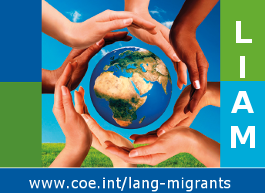Formal, non-formal and informal learning
Educational systems exist to promote formal learning, which follows a syllabus and is intentional in the sense that learning is the goal of all the activities learners engage in. Learning outcomes are measured by tests and other forms of assessment. Adult migrants engage in formal learning when they take a course in the language of their host community. If the course is based on an analysis of their needs, it will follow a syllabus that specifies the communicative repertoire to be achieved by successful learners. The nature and scope of that repertoire should be reflected in whatever forms of assessment accompany the course.
Non-formal learning takes place outside formal learning environments but within some kind of organisational framework. It arises from the learner’s conscious decision to master a particular activity, skill or area of knowledge and is thus the result of intentional effort. But it need not follow a formal syllabus or be governed by external accreditation and assessment. Non-formal learning typically takes place in community settings: swimming classes for small children, sports clubs of various kinds for all ages, reading groups, debating societies, amateur choirs and orchestras, and so on. Some non-formal learning arrangements become increasingly formal as learners become more proficient; one thinks, for example, of graded exams in music and other performing arts. Adult migrants engage in non-formal language learning when they participate in organised activities that combine the learning and use of their target language with the acquisition of a particular skill or complex of knowledge.
Informal learning takes place outside schools and colleges and arises from the learner’s involvement in activities that are not undertaken with a learning purpose in mind. Informal learning is involuntary and an inescapable part of daily life; for that reason, it is sometimes called experiential learning. Learning that is formal or non-formal is partly intentional and partly incidental: when we consciously pursue any learning target we cannot help learning things that are not part of that target. Informal learning, however, is exclusively incidental.
These definitions and distinctions help us to understand the complexity of successful language learning. When children acquire their first language they do so not because they are taught. Their learning is an incidental result of their participation in family life, and the linguistic skills they develop and the concepts they master reflect the social practices of their immediate environment. Similarly, adults are said to learn a second or subsequent language “naturalistically” when they do so by living among speakers of the language and interacting with them on a daily basis. Their emerging communicative repertoire is shaped not by a conscious learning agenda but by their attempts to satisfy their social and material needs. These are both examples of informal learning. In either case informal learning may be supported by non-formal learning: intentional learning that is prompted, for example, by the explanations parents give to their children and adult learners receive from those with whom they interact.
When children learn to read and write in their first language, they generally do so as part of their formal education and as a result of conscious effort; and when adult migrants attend a course in the language of their host community, they are aiming to achieve a prescribed level of proficiency. In both cases, however, intentional learning is usually accompanied by incidental learning; and the effects of incidental learning in formal educational contexts are reinforced by informal and non-formal learning in the world outside. The literacy of young children benefits from their out-of-school engagement in the reading they undertake for pleasure or in pursuit of a special interest, and the proficiency of adult migrants in the language of the host community is likely to be enhanced when they have opportunities to interact informally with other speakers of the language.
These considerations prompt two questions. First, how can those responsible for organising language courses for adult migrants ensure that their learners have opportunities to use the language outside the classroom and thus benefit from informal/non-formal learning? One obvious answer is to arrange cultural visits and social activities that bring the learners into informal contact with members of the host community. Another is to encourage learners to participate in social activities, or to arrange such activities specifically for their benefit. Secondly, if adult migrants who have learnt the language of their host community “naturalistically” are required to demonstrate proficiency in that language in order to secure a residence permit or citizenship, can their informal/non-formal learning be recognised without requiring them to take a test? Any attempt to answer this question must consider alternative forms of assessment (the OECD has explored the recognition of non-formal and informal learning by adults in a three-year project).
At a time when many Council of Europe member states are receiving large numbers of adult refugees, the distinctions between formal, non-formal and informal learning help us to formulate radical and cost-effective responses to questions that have previously been answered in traditional ways. Instead of organising formal language courses, for example, in the short term it makes much better sense, and is certainly more affordable, to involve volunteers in the organisation of social activities that promote non-formal and informal language learning. If appropriately designed and efficiently implemented, such activities can provide migrant learners with a sound basis for participating in formal language courses at a later stage if that is judged to be desirable or necessary.
DL
Related resources
- Language tests for social cohesion and citizenship – an outline for policy makers, 2008, ALTE Authoring Group (Association of Language Testers in Europe)
EN FR
- OCDE : Skills beyond school - Recognition of Non-formal and Informal Learning



